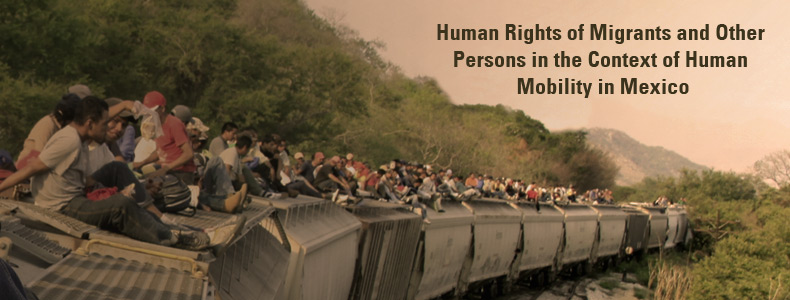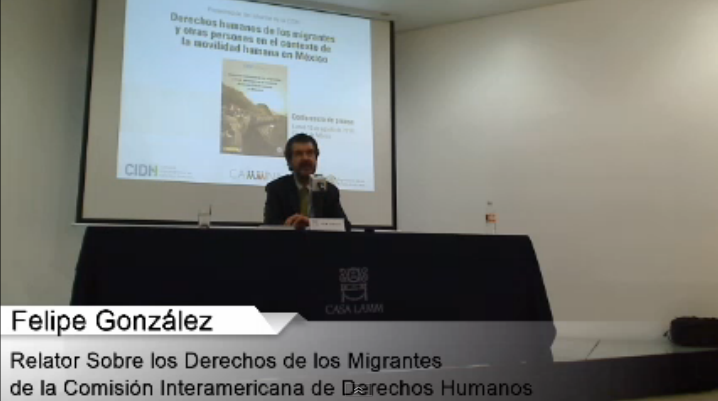
The Inter-American Commission on Human Rights (IACHR) has released a report on the human rights of migrants, migrants’ rights advocates, victims of human trafficking, displaced persons, and others who experience “extreme vulnerability” in Mexico. [IACHR Press Release] The report, Human Rights of Migrants and Other Persons in the Context of Human Mobility in Mexico, details the acts of violence, denial of due process and judicial protection, and other violations against individuals migrating within or through Mexico, and characterizes the situation as “one of the worst human tragedies in the region today.” IACHR, Human Rights of Migrants and Other Persons in the Context of Human Mobility in Mexico (2013), p. 3.
Background and Preparation of the Report

This latest thematic report presents and analyzes information gathered by the Commission’s Rapporteur on the Rights of Migrants, Felipe Gonzalez, during his 2011 working visit to Mexico, and during public hearings before the Commission between 2008 and 2013. The Commission formally presented the report this morning in Mexico City, following its 152nd Extraordinary Period of Sessions.
In explaining the impetus behind this report’s publication, the Commission highlights Mexico’s role as a hub or crossroads for migration throughout the Americas, and explains that the violence and crime that has “severely eroded” public security in Mexico has complicated the State’s response, resulted in increased use of violence and human rights violations by State agents, and revealed the specific vulnerabilities of migrants in Mexico. Id. at p. 2. The Commission decided to further investigate the situation after receiving information, including from civil society organizations, describing:
[…] multiple cases in which migrants are abducted, driven into forced labor, murdered, disappeared and, in the case of women, frequently the victims of rape and sexual exploitation by organized crime [; … and] a considerable number of cases, [in which] State agents—members of the various police forces or personnel of the National Institute of Migration—have been directly involved in the commission of the crimes and human rights violations listed above.
Id. at p. 2-3. The information gathered led the Commission to conclude, “At the present time, the extreme vulnerability of migrants and other persons to the heightened risks of human mobility in Mexico is one of worse human tragedies in the region, involving large-scale and systematic human rights violations.” Id. at p. 3.
The report text, which contains a wealth of useful citations to IACHR hearings and many other sources, is divided into four chapters. The first outlines the background and preparation of the report, while the following three chapters focus on specific topics.
Violence and Discrimination against Migrants & Rights Advocates
Chapter II begins with an explanation of Mexico’s role as a country of origin, destination, transit and return for migrants and also analyzes internal migration and displacement within Mexico. The text then looks at the causes of these migration trends, before examining specific, commonly occurring human rights violations experienced by migrants and their advocates. These include: robberies and extortion, kidnapping, human trafficking, disappearances, sexual violence, abuses against migrant children, excessive use of force and other abuses of authority, impunity, and inadequate access to justice. Mexico’s response to discrimination and violence against migrants is then analyzed, following by an analysis of the relevant international standards, including with regard to women’s human rights and the State’s overarching obligations to respect, ensure, and not discriminate in its implementation of human rights standards.
Immigration Detention & Due Process Guarantees
Chapter III focuses on immigration detention and due process guarantees in immigration proceedings. It begins by reviewing the relevant international standards, before examining Mexico’s specific procedures. The chapter outlines several key concerns, including flaws or inadequacies in the verification and review of the appropriateness of detention, the use of detention or its alternatives, detention of children and adolescents, indefinite immigration detention, respect for the right to apply for recognition of refugee status, and conditions in immigration detention.
Migrants’ Economic, Social, and Cultural Rights
The final chapter analyzes the economic, social, and cultural human rights of migrants. After identifying the relevant international standards, the report describes principal areas of concern, including with regard to regularization and access to immigration documentation, recognition of the right to nationality, labor rights, and the rights to education and to health.
Recommendations to the State
Each of the substantive chapters concludes with highly specific recommendations to the State. As summarized in the introduction, these recommendations pursue three overarching goals:
[…] first, States must craft a comprehensive State policy, backed by adequate public resources, to ensure that migrants who are or have been victims of crimes and human rights violations have adequate access to justice and that such acts of violence are prevented, investigated, punished, and adequately redressed.
The second objective is to urge States to create the conditions necessary for migrants to be able to turn to the Mexican justice system to seek redress for the acts of violence they have endured, and to be treated respectfully when they do so.
The third objective of the recommendations is that the Mexican State take measures to redefine the traditional concepts of the role of migrants in society, eradicate discriminatory socio-cultural patterns that prevent migrants from exercising their human rights to the fullest, and guarantee their unrestricted access to the justice system when they have been victims of crime or violations of their human rights.
Id. at p. 16.
The Inter-American Commission on Human Rights
The Inter-American Commission on Human Rights is a regional human rights body charged with monitoring, promoting, and protecting human rights in the 35 Member States of the Organization of American States. Through its rapporteurships, the Commission develops its understanding and legal analysis of specific areas of concern in the countries of the region and with regard to particular topics, including the rights of migrants.
The Rapporteurship on the Rights of Migrants’ previous report focused on migration detention in the United States. See IACHR, Report on Immigration in the United States: Detention and Due Process (2011).
For more information about the Commission, visit the Inter-American Human Rights System page of the Online Resource Hub.
